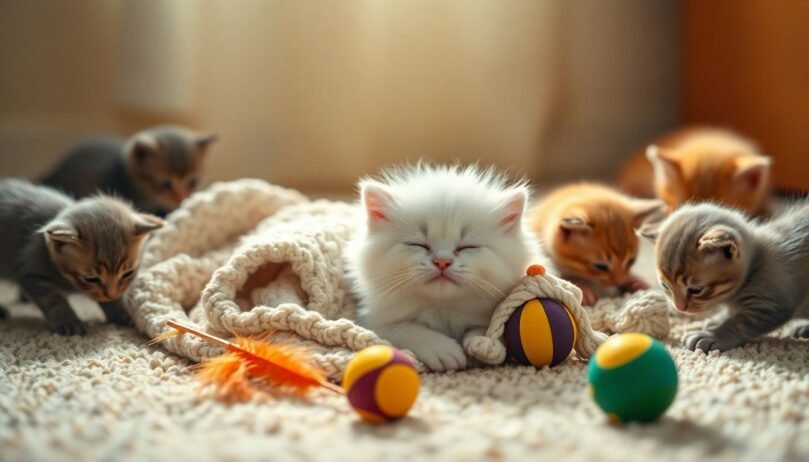Your Kitten’s Development in the First 6 Weeks
- 2 February 2025
- BuyAPet Editorial Team
- All Cats, Cat Health
Your Kitten’s Development: A Week-by-Week Guide to the First 6 Weeks
The journey of a kitten’s early life is both fascinating and crucial. In just six weeks, they transform from helpless newborns into playful little explorers. Understanding each stage helps you give the right care at the right time—so your tiny friend grows into a confident, healthy cat.
Quick Navigation
The first few days: a vulnerable beginning What changes in weeks 1–6? Week 1: Eyes opening & early senses Week 2: Stronger, steadier, more social Week 3: Play blossoms & weaning begins Weeks 4–6: Agility, litter habits & confidence Key takeaways & what’s nextThe First Few Days: A Vulnerable Beginning
Newborn kittens are born blind and deaf, and cannot regulate their body temperature. They depend entirely on mum (queen) for warmth, nursing, and stimulation to toilet.
What’s normal
- Sleeping and nursing in cycles every 2–3 hours
- Soft twitching while asleep (developing nervous system)
- Umbilical cord dries and falls off within a few days
Care tips
- Keep the nesting area warm (approx. 26–29 °C) and draft-free
- Limit visitors; handle briefly and gently if the queen is calm
- Let mum groom and stimulate toileting; provide quiet and privacy
Rapid Growth & Development: What to Expect
Kittens progress quickly through key milestones in the first six weeks. Here’s a quick snapshot.
| Week | Milestones | Care Focus |
|---|---|---|
| Week 1 | Eyes begin opening (7–14 days), startle to sound | Warmth, quiet, brief gentle handling |
| Week 2 | More coordinated crawling, early play with littermates | Short positive human contact |
| Week 3 | Play intensifies; first tastes of wet food | Introduce shallow litter tray; start weaning |
| Week 4 | Walking improves; clumsy pouncing | Safe play space; frequent short social sessions |
| Week 5 | Climbing/jumping; better litter habits | Expand environment; gentle novel sounds/textures |
| Week 6 | Confident play; mostly on solids | Routine, positive handling, vet guidance for next steps |
Week 1: Eyes Open, Senses Switch On
Sensory Development
Eyes begin to open between day 7–14; vision is initially cloudy and improves over the next weeks. Hearing sharpens soon after; scent helps them locate mum.
Motor Skills
Movements are wobbly and reflex-driven. You’ll see stretching and slow scooting as muscle tone builds.
Week 2: Growing Stronger & More Coordinated
Increased Mobility
Kittens crawl more purposefully and begin short, shaky stands. Play-fights and tiny pounces start to appear.
Socialisation Starts
Brief, positive human contact matters. Keep sessions short and calm, letting the queen set the tone.
Week 3: Playtime Blooms & Weaning Begins
Play Behaviour
Chasing, batting, and pouncing practice hunting skills. Offer soft, kitten-safe toys (small balls, fabric wands).
Weaning
Introduce a shallow dish of warmed, high-quality kitten wet food (can be mixed with kitten milk replacer). Expect nibbling at first.
Litter Box Foundations
Place a shallow, non-clumping litter tray near the nest. Gently set kittens in after naps and meals; praise successes.
Weeks 4–6: Agility, Confidence & Independence
Motor Skills: Jump, Climb, Pounce
- Week 4: steadier walking; short climbs
- Week 5: improved balance; playful sprints
- Week 6: confident exploring; quick reactions
Socialisation: People & Pets
Create positive, gentle experiences with different voices, textures, and safe environments. Keep other pets calm and introductions gradual.
Feeding Progress
- Week 4–5: largely wet kitten food; start adding small amounts of dry kitten kibble if desired
- Week 6: mostly on solids; multiple small meals daily
Litter Habits
Most kittens reliably use the tray by Weeks 5–6. Keep trays spotless, shallow, and easily accessible.
Conclusion: Preparing for Kittenhood
Key Takeaways
- Eyes open around days 7–14; hearing and vision sharpen over the next weeks.
- Mobility and play ramp up quickly from Week 2 onward.
- Weaning typically starts around Week 3; by Week 6 many kittens are mostly on solids.
- Start litter training early with shallow, non-clumping litter and lots of praise.
- Gentle socialisation and consistent routines build confidence and good habits.
Looking Ahead
As your kitten approaches 8 weeks, expect bolder play, better coordination, and longer awake periods. Keep play enriching, continue gentle social time, and check in with your vet about vaccination, microchipping, and health checks to set them up for a great start.
This article is educational and not a substitute for veterinary advice. If you have concerns, contact your vet.
